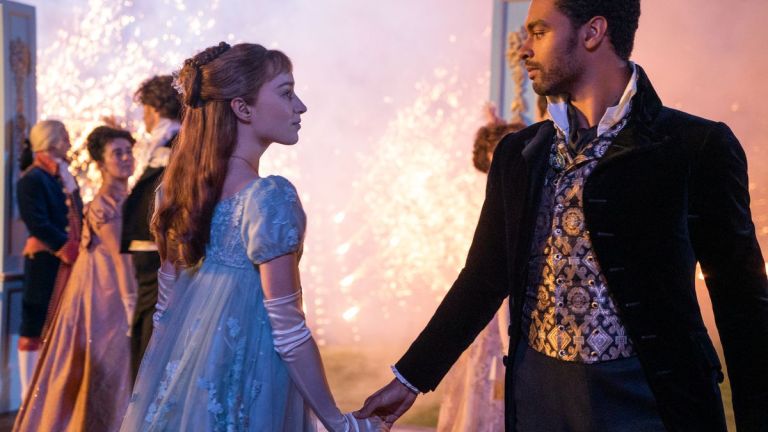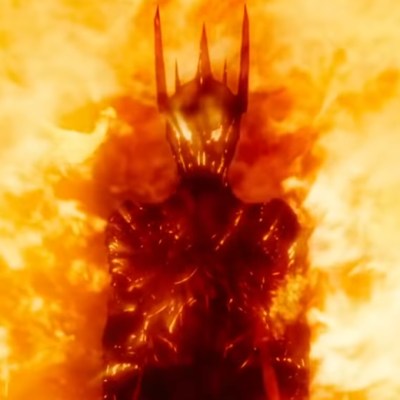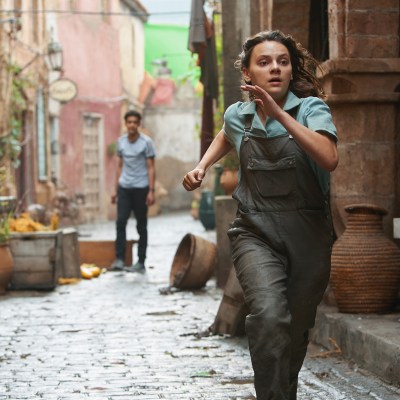Will Bridgerton Become the Next Game of Thrones?
Forget about epic fantasy. The next Game of Thrones is going to be something new, like Bridgerton.

Traditionally, when critics discuss “the next Game of Thrones” or when studios, networks, and streamers search for “the next Game of Thrones,” the candidates put forth have much in common, genre-wise, with the late, sometimes great HBO series. They are the Lord of the Rings TV show or His Dark Materials or The Witcher—aka epic fantasy series that, by and large, have the look and feel of a Game of Thrones, ignoring the fact that, contextually, the fantasy elements of Game of Thrones were only one factor in its enormous success.
This isn’t an unfamiliar Hollywood tale. After a massive commercial success, the entertainment industry tends to throw its money behind (for want of a better word) knock-offs—stories that may be good or moderately successful, but are only alike their culture-changing predecessors in the kinds of superficial ways that don’t actually matter that much. Take, for example, the big-screen adaptation of Eragon, which was greenlit following the success of the big-screen Lord of the Rings trilogy. Eragon may have sweeping shots of a small figure amidst the vast and fantastical New Zealand countryside, but the depth, scale, and texture of its enjoyable source material, not to mention the budget and care that went into its adaptation, were not comparable to the Lord of the Rings, and the reviews and box office reflected that.
Genre is a shorthand moviemakers use to communicate to audiences what a film is and why they might like it, so it’s easy to understand why producers would overweigh the importance of genre when trying to recreate the success of a Lord of the Rings or a Harry Potter or a Twilight. But I’d like to shift the conversation, and expand our imagination of where the pop culture landscape could be heading. When theorizing about “the next Game of Thrones,” if what we mean by that is “a mega-successful and long-running show that becomes so central to pop culture that even people who don’t watch it can reference it,” I would argue we shouldn’t necessarily be looking at the epic fantasy genre. Instead may I put Bridgerton forward for consideration?
Since its Christmas release worldwide, Bridgerton has not only consistently been in the Netflix Top Ten in multiple territories around the world but also consistently in the news, most recently for its record-breaking success. Netflix announced today (via Deadline) that the race-bending period romance adapted from the Julia Quinn novels is, by some measure, its “biggest series ever.” The 10-episode first season of Bridgerton was watched (either partially or fully) by a record 82 million households, which is 19 million households more than the streamer’s four-week projection made at the drama’s 10-day mark. This means that, unlike many of Netflix’s bright-and-fast-burning Top Ten-ers, Bridgerton‘s popularity is sticking. Bridgerton has already been greenlit for a second season, but it’s not hard to imagine the series running for the eight seasons showrunner Chris Van Dusen said he is hoping for.
But popularity alone does not make The Next Game of Thrones, though it is certainly one major factor. Plenty of TV series have that magic combination of critical and commercial success in their first seasons before fizzling out in the second or third. What makes a Game of Thrones or, dare I say, a Bridgerton, different? Well, for one, like Game of Thrones before it, Bridgerton is a TV show based on a many-book series, which provides a vast blueprint to pull from. Structurally, both source material series have many changing POV characters. In A Song of Ice and Fire, the POVs characters change from chapter to chapter and, sometimes, from book to book. In The Bridgerton Series, the POV character changes from book to book. This makes for a particularly fertile narrative ground for adaptation, as the source material doesn’t solely privilege one or even a few characters or POV, leaving TV showrunners to balance the ensemble out in the process of adaptation.
Both stories are built around themes of family and power within a complex and often cutthroat world, and they both have a group of siblings at their heart, tying the many storylines together. I’m not here to make one-for-one comparisons because, honestly, it is the opposite of my point, but I will say: Daphne, who values a more traditionally feminine life, has a lot in common with Sansa Stark, and Eloise, who begrudges the pressure to get married and become a mother, is bascially Bridgerton’s Arya Stark.
Game of Thrones and Bridgerton‘s narrative interests diverge in some ways, but they are both structured around the affairs of ruling society, even if those dynamics and scenarios plays out in different narrative languages—i.e. violence/war vs. romance/marriage. In Game of Thrones, the weapon of choice is, well, weapons and the stakes are one’s life and the lives of one’s loved ones; in Bridgerton, the weapon of choice is gossip, and the stake are one’s lives and the lives of one’s loved ones, though measured against a different rubric. In Bridgerton and romance as a genre in general, domestic security and happiness, including and most especially for women, is treated as the valid and worthwhile goal that it is. It is depicted as a victory worth winning in the same way that the accumulation of male-coded political power and military might is treated in other genres.
And let’s talk about the power of the romance genre. Romance is a genre made by and for women and, because our culture tends to devalue the feminine, romance storytelling has a stigma that has historically kept many men and some women from engaging with it. Because of this, fans of romance are a traditionally an underserved audience when it comes to adaptation, despite it being the most lucrative book genre market. According to Glamour, the billion-dollar romance book industry made up 23 percent of the fiction market in 2016, but the TV and film industry seems surprised every time a Twilight, Outlander, or Crazy Rich Asians comes along, as if they have forgotten that women make up half of the planet’s population.
It’s only in recent years, most notably with the success of bigger budget romance adaptation Outlander, that TV studios and distributors have started to invest larger budgets in unabashedly romantic fare, presumably because more women and more men who listen to women when they speak have become Hollywood decision-makers. (Though, by and large, the statistics are still dismal and depressing.) For whatever reason, the kind of storytelling that was once only seen in the sphere of the primetime soap (a valid venue in its own right, but one with modest budgets and limited crossover marketing) is now becoming more common in larger, more mainstream arenas. Bridgerton is the perfect example. With its sizable budget and broad marketing campaign, Netflix wasn’t just looking to capture the audience of a Shonda Rhimes broadcast venture like Grey’s Anatomy, but to rebrand romance as a mainstream genre, and the women who love it (many of them Black woman and women of color) as an audience worth investing in.
If we’re going to have another Game of Thrones, and I hope we do because they have value in an increasingly fractured culture, then it’s probably going to look a lot different than that great “tits and dragons” fantasy saga. It might have some things in common—such as a large, pretty ensemble cast of characters that allow for multiple entry points; a strong existing source material that gives a blueprint for a complex world and where its families of characters is heading; and the production values to facilitate an escape from our increasingly distressing world into a story that feels the right balance of fantastical yet real. But it’s going to be something new and exciting, the way Game of Thrones was new and exciting for many people. Maybe it won’t be Bridgerton, but it probably won’t be Game of Thrones 2.0. We’ve done that already.




